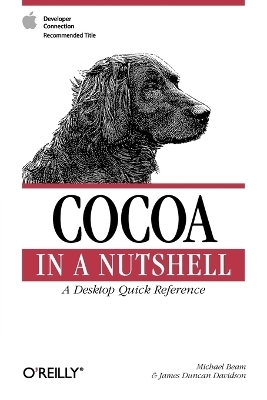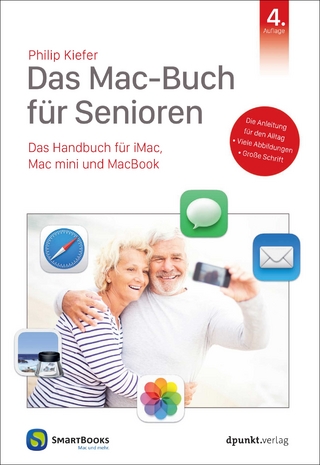
Cocoa in a Nutshell
O'Reilly Media (Verlag)
978-0-596-00462-0 (ISBN)
Cocoa(r) is more than just a collection of classes, and is certainly more than a simple framework. Cocoa is a complete API set, class library, framework, and development environment for building applications and tools to run on Mac OS(r) X. With over 240 classes, Cocoa is divided into two essential frameworks: Foundation and Application Kit. Above all else, Cocoa is a toolkit for creating Mac OS X application interfaces, and it provides access to all of the standard Aqua(r) interface components such as menus, toolbars, windows, buttons, to name a few. Cocoa in a Nutshell begins with a complete overview of Cocoa's object classes. It provides developers who may be experienced with other application toolkits the grounding they'll need to start developing Cocoa applications. Common programming tasks are described, and many chapters focus on the larger patterns in the frameworks so developers can understand the larger relationships between the classes in Cocoa, which is essential to using the framework effectively. Cocoa in a Nutshell is divided into two parts, with the first part providing a series of overview chapters that describe specific features of the Cocoa frameworks.
Information you'll find in Part I includes: * An overview of the Objective-C language * Coverage of the Foundation and Application Kit frameworks * Overviews of Cocoa's drawing and text handling classes * Network services such as hosts, Rendezvous URL services, sockets, and file handling * Distributed notifications and distributed objects for interapplication communication * Extending Cocoa applications with other frameworks, including the AddressBook, DiscRecording, and Messaging frameworks The second half of the book is a detailed quick reference to Cocoa's Foundation and Application Kit (AppKit) classes. A complement to Apple's documentation, Cocoa in a Nutshell is the only reference to the classes, functions, types, constants, protocols, and methods that make up Cocoa's Foundation and Application Kit frameworks, based on the Jaguar release (Mac OS X 10.2). Peer-reviewed and approved by Apple's engineers to be part of the Apple Developer Connection (ADC) Series, Cocoa in a Nutshell is the book developers will want close at hand as they work. It's the desktop quick reference they can keep by their side to look something up quickly without leaving their work.
Cocoa in a Nutshell is the book developers will want close at hand as they work. It's the desktop quick reference they can keep by their side to look something up quickly without leaving their work.
Michael Beam lives in Houston, Texas, and is a Unix applications developer for a seismic data processing firm (X11 and Motif are a far cry from Cocoa!). Mike graduated from the University of Texas at Austin (Hook 'Em!) in 2001, where he studied physics and astronomy. When he's not at his day job, or writing about Cocoa in his sometimes night job, Mike spends his time with his friends, and his soon-to-be wife Heather. To unwind from the stresses of life Mike enjoys a good book, and practices Chayon-Ryu martial arts, and indulges in favorite sin of watching South Park. James Duncan Davidson is a freelance author, software developer, and consultant focusing on Mac OS X, Java, XML, and open source technologies. He is the author of Learning Cocoa with Objective-C (published by O'Reilly & Associates) and is a frequent contributor to the O'Reilly Network online website as well as publisher of his own website, x180 (http://www.x180.net), where he keeps his popular weblog. Duncan was the creator of Apache Tomcat and Apache Ant and was instrumental in their donation to the Apache Software Foundation by Sun Microsystems . While working at Sun, he authored two versions of the Java Servlet API specification as well as the Java API for XML Processing.Duncan regularly presents at conferences all over the world on topics ranging from open source and collaborative development to programming Java more effectively. He didn't graduate with a Computer Science degree, but sees that as a benefit in helping explain how software works. His educational background is in Architecture (the bricks and mortar kind), the essence of which he applies to every software problem that finds him. He currently resides in San Francisco, California.
Preface I. Introducing Cocoa 1. Objective-C Objects Messaging Classes Creating Object Instances Memory Management Deallocating Objects Categories Naming Conventions 2. Foundation Data Key-Value Coding Working with Files Bundles and Resource Management Archiving Objects User Defaults Notifications Operating System Interaction Threaded Programming 3. The Application Kit AppKit Design Patterns Nibs Application Architecture Controls Menus Sheets Drawers Toolbars Event Handling Document-Based Applications 4. Drawing and Imaging The Role of Quartz Coordinate Systems Graphics Contexts Working with Paths Drawing Text Working with Color Working with Images Transformations 5. Text Handling Text System Architecture Assembling the Text System 6. Networking Hosts URL Resources Rendezvous Network Services Sockets NSFileHandle 7. Interapplication Communication NSPipe 8. Other Frameworks AddressBook The Message Framework Disc Recording Frameworks Third-Party Frameworks II. API Quick Reference How to Use This Quick Reference 9. Foundation Types and Constants Data Types Enumerations Global Variables Constants Exceptions 10. Foundation Functions Assertions Bundles Byte Ordering Decimals Java Setup Hash Tables HFS File Types Map Tables Object Allocation Objective-C Runtime Path Utilities Points Ranges Rects Sizes Uncaught Exceptions Zones 11. Application Kit Types and Constants Data Types Enumerations Global Variables Exceptions 12. Application Kit Functions Accessibility Applications Events Fonts Graphics: General Graphics: Window Depth Interface Styles OpenGL Panels Pasteboards System Beep 13. Foundation Classes 14. Foundation Protocols 15. Application Kit Classes 16. Application Kit Protocols Method Index III. Appendix Appendix: Resources for Cocoa Developers Index
| Erscheint lt. Verlag | 24.6.2003 |
|---|---|
| Reihe/Serie | In a Nutshell (O'Reilly) |
| Verlagsort | Sebastopol |
| Sprache | englisch |
| Einbandart | kartoniert |
| Themenwelt | Informatik ► Betriebssysteme / Server ► Macintosh / Mac OS X |
| ISBN-10 | 0-596-00462-1 / 0596004621 |
| ISBN-13 | 978-0-596-00462-0 / 9780596004620 |
| Zustand | Neuware |
| Haben Sie eine Frage zum Produkt? |
aus dem Bereich


